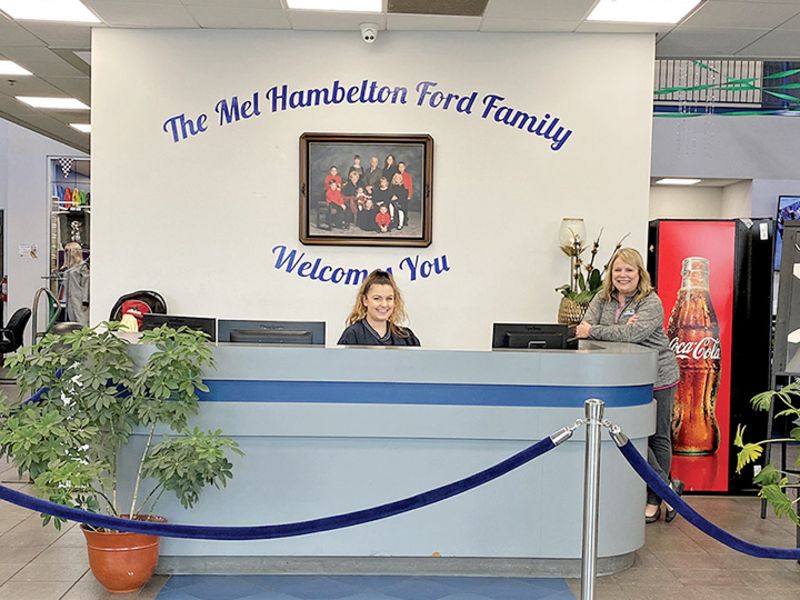
Last month, Mel Hambelton Ford in Wichita, Kan., found itself at the center of a coronavirus cluster.
Five confirmed cases of the respiratory illness caused by the virus were connected to the dealership, the health department in Sedgwick County, Kan., news release.
It is an event that illustrates the anxiety of many retailers at the moment, with employees, customers, managers and local officials all caught up in an unfamiliar crisis.
The county health department stepped in to issue a public notification because of potential customer exposure to a dealership employee who contracted COVID-19 but couldn’t identify every recent contact.
Kansas had deemed dealerships to be essential functions that could operate during the coronavirus threat. And the store remained open despite the confirmed cases, a decision county public health officials said is usually left to individual businesses. But working with health department guidance, the dealership increased cleaning and distancing.
In all, five employees in sales, parts, reconditioning and the business development center tested positive starting in March, dealership owner Lisa Hambelton told Automotive News. She said the store, which sells an average of 360 new and used vehicles each month, hasn’t been notified of any other confirmed cases.
All of the employees who contracted COVID-19 have recovered and returned to work, Hambelton said. The county health department declined to provide details about whether more positive cases linked to the dealership were discovered, but it said the public is no longer at risk there.
Extra precaution is now a retailer reality in the face of the potentially deadly disease. Public health and workplace safety experts say isolation of ill employees, extra cleaning and sanitizing, and communication with staff members and customers are important actions to take quickly if COVID-19 is discovered in the workplace.
“There is no handbook for this,” Hambelton told Automotive News.
But she added: “Getting those weeks behind me now, I can see that some of the things that we’re doing are working.”
Reports of outbreaks of a contagious illness, such as a norovirus or COVID-19, are only made public when there’s a risk of public transmission, said Adrienne Byrne, Sedgwick County’s health director. That’s what happened at Mel Hambelton Ford.
Being designated as a “cluster” means that at least two people who were not part of the same household were confirmed to have COVID-19 at a certain time and location, Byrne said.
A cluster is considered to be over after two incubation periods, which amounts to 28 days, have passed since the last known infected person has recovered, Byrne said. That window was near closing for the dealership, she added.
Employers should be cognizant of how employees and customers will receive the news, urged Travis Vance, a partner at law firm Fisher Phillips in Charlotte, N.C., and co-chairman of the firm’s Workplace Safety and Catastrophe Management Practice Group.
Sick employees should be sent home, and business leaders should inform the entire work force of the situation, he recommended — and also privately contact customers who may have been exposed, a transparent step that could preserve business relationships.
“If you don’t tell them and they find out some other way, they’re not going to be happy,” said Vance, also chairman of Fisher Phillips’ COVID-19 task force, who has advised the National Automobile Dealers Association on the subject.
Hambelton said she and her general manager provided employees with a forum for concerns. Some public social media comments questioned why the dealership remained open, while others commended its transparency.
“Have we heard concerns? Yes, of course we have. From customers and employees,” she said in an email. “But we addressed every one of them.”
She has received compliments from customers and employees, and many employees have thanked her for choosing to stay open.
“And customers have commented on social media about what kind of place we are all year long, not just during the pandemic.”
But the rules on how to act are not set in stone, the dealer has learned.
The county health department recommends businesses increase the frequency of cleaning and maintain distancing practices. And wearing cloth masks is strongly encouraged, but not required. Hambelton said just two of her employees have chosen to wear them.
The store sent home ill employees and those who worked in close proximity, Hambelton said, and anyone who is sick must have a negative COVID- 19 test result or a doctor’s note before returning to work.
Facilities are now cleaned more often, she said. The dealership hired a crew in March to conduct a sanitizing treatment every other Sunday, when the dealership is closed. Employees no longer join customers on test drives.
Closing temporarily is not required, Byrne told Automotive News. Health officials could recommend closure if a business had a high number of cases, she added, but that was not the case at Mel Hambelton Ford.
“If they had other cases, then that might be different,” Byrne said. “But right now, they sound like they’re doing what they need to do and are taking this quite seriously.”
Hambelton said she opted not to close the store because of the economic impact that would have had on her employees.
“I could afford to take two months or a month off or two weeks off, but I have a lot of employees who couldn’t afford to do that,” she said. “For me, it was about keeping my 250 people with health benefits and paychecks.”